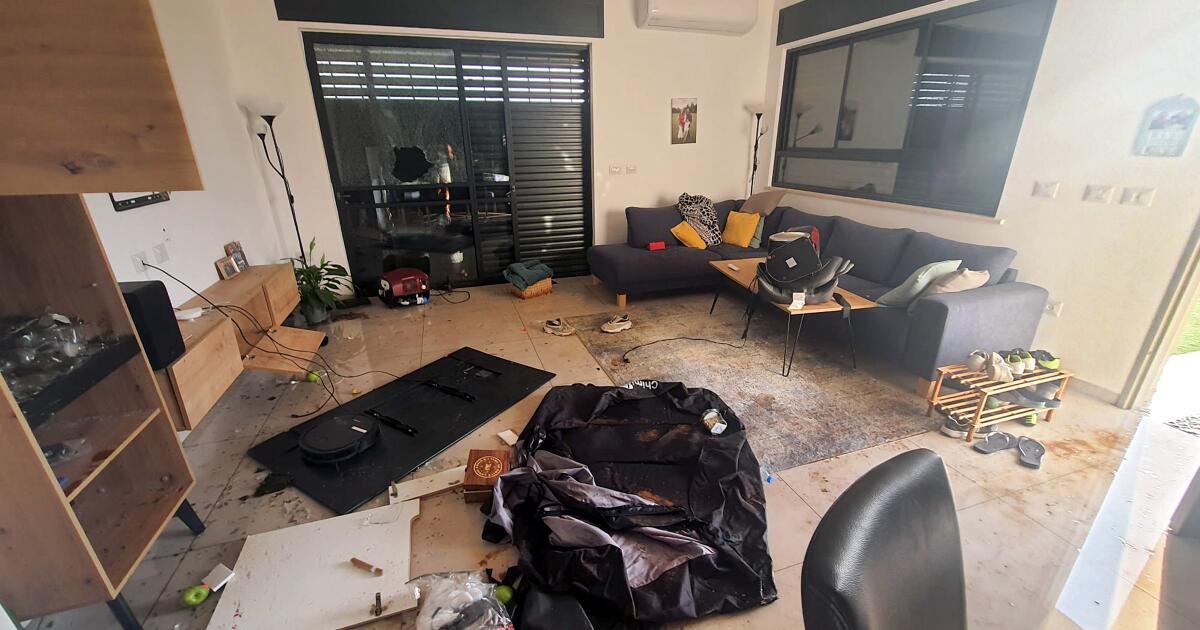
The safe room door had no lock. An attacker from Hamas started jiggling the handle.
On the other side, Addi Cherry, her husband and her teenage son held on “for life,” pushing it, trying to keep it closed. They’d heard the attackers break into their home moments earlier, heard screaming and shouting and threats to kill. “The terror, you feel it. It’s hard to explain, but your blood just freezes.”
The jiggling at the door stopped.
The family listened as two neighbors soon rushed into their home to help. They heard the gunfire, heard one of the attackers get shot, heard the thud of a body hitting the ground.
And the Cherry family stayed “really, really, really quiet.”

Addi Cherry, 46, answers questions from reporters in San Diego Thursday after sharing the story of her and her family’s survival.
(Nelvin C. Cepeda/The San Diego Union-Tribune)
They spent the next several hours hunkered in that room, silent, without food or water, air growing thin, listening as Hamas attackers ravaged their kibbutz Oct. 7.
About 1,400 people in Israel were killed in the surprise attack by Hamas — designated as a terrorist organization by the U.S., Canada and European Union — and more than 200 were taken hostage. The Associated Press reported Thursday that the ensuing military offensive by Israel into Gaza has killed more than 10,000 people, according to the Health Ministry run by Hamas.
The Cherrys’ kibbutz was Nahal Oz, a village of about 500 people sitting roughly 800 meters from the border with Gaza. Their home was the closest to it.
On Thursday, she shared her story of survival with reporters in San Diego, where the Jewish Federation of San Diego brought her and her family for several days so they could decompress. The head of the federation said it’s important for people to hear her experience, and to push back against those who deny that the Oct. 7 attack happened.
Nahal Oz is in Shar’ar HaNegev, a sister region to San Diego. The Jewish Federation of San Diego has long relationship with Shar’ar HaNegev. Its mayor, Ofir Liebstein, died Oct. 7, killed in a gun battle with Hamas.

Photo of the Cherry family in Israel. From left is Addi Cherry’s son Guy, husband Oren, son Yahav, Addi, and daughter Shani.
(Courtesy of Addi Cherry)
The Cherry family — she’s a health economist, her husband is an electrical engineer — moved to the kibbutz in 2017. Sitting so close to Gaza, each child’s bedroom was fortified to withstand rockets.
When Cherry, 46, tells the story of the attack, she starts with the evening before. Many neighbors were preparing for a big celebration set for the next day because it marked the 70th anniversary of the kibbutz. She and a few dozen people rehearsed on a stage, “singing and praying for peace.”
“We were like in euphoria,” Cherry said. “And with that feeling, we went to bed.”
She woke up to hundreds of rockets.
It wasn’t quite 6 a.m. Her husband raced to get their 9-year-old son, she grabbed their 12-year-old daughter, and they all hid in their 15-year-old son’s bedroom.

Nervously rubbing her fingers against one another, Addi Cherry recounts her family’s story on the day of the attack.
(Nelvin C. Cepeda/The San Diego Union-Tribune)
The door had no lock, intentionally, so that if a rocket hit the home, rescuers easily could get into the fortified room to help survivors.
At some point, her husband went to peek outside. She said he started yelling, “Oh, my God, Hamas in the kibbutz!” She said he saw three or four of them, dressed in black and carrying rocket-propelled grenades and weapons.
When a group of attackers broke in, she texted neighbors on the kibbutz’s WhatsApp, saying they were inside. “And two amazingly brave people from the kibbutz run to our rescue. A fight was going on, a war inside our house while we’re in the room.”
“They injured one or two of the terrorists,” Cherry said. “We don’t know, but we heard yelling and crying and then we heard like the thump of a body or bodies. We’re not sure because it was really chaotic.”
Then it grew quiet. She said that some time after the attackers left the home, they heard several more people come inside. They, too, tried to open the bedroom door.
Hours later, Israeli soldiers rescued and evacuated them. “But when we went outside, it’s literally like we stepped into hell,” she said. As they left the home, soldiers surrounded her children, so they would not see the destruction.

The scene outside the Cherry home after the Hamas attack.
(Courtesy of Addi Cherry)
She said she wants to see all of the people taken hostage by Hamas that day be returned. “If there is one wish I can ask, is do whatever we can in order for them to come back. Not tomorrow. Not tomorrow. Today.”
The Cherry family eventually made it to Belgium, where she has relatives. She said they intend to return to Europe and enroll the children in school. She’s not sure she can bear to return to her home in the kibbutz.
She also said she is grateful for her family’s respite in San Diego, which included visits to the zoo, SeaWorld and the USS Midway Museum. She feels like she can breathe. The other day, Cherry heard the sound of her children. They were laughing.






